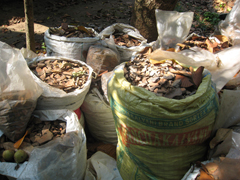Trade with the Malabar Coast
By Shalva Weil
Linguistic evidence suggests the possibility of ancient Jewish communities and early commercial connections between India and the Holy Land. The articles brought on King Solomon’s ships and mentioned in the Biblical Book of Kings by designations only known in ancient Tamil, such as kofim (apes) tukim (peacocks), almag (sandalwood =valgum), were of Indian origin.
In the Book of Esther, King Ahaseuerus’ kingdom stretched from Hoddu, (generally accepted to be India), to Kush (generally accepted to be Ethiopia).
Travellers’ tales in the Talmud mention trade with India, including specific commodities, such as Indian ginger and iron.
Archeological excavations at the site of Pattanam, near Muziris in Kerala, have unearthed identification of the port of Muziris, mentioned by the Romans, as well as in local Tamil texts. Dr. P.J. Cherian, a researcher and director of the Pattanam excavations since 2007, is optimistic that archaeologists will find some material evidence of Jewish or Middle Eastern trading links. “One of the interesting finds of the last season,” he said,” was the turquoise glazed pottery of West Asian origin in the pre-Roman layers. We are awaiting its analytical report and hope it will be of help in tracing the early Jewish links with the Malabar Coast.”
From the sixth to the eleventh century CE, Jewish merchantmen known as Raadanites traded between East and West, from the Middle East to South Asia and back.
Medieval Jewish texts, dating from the 11th to the 13th centuries, discovered in the Cairo Genizah, include documents describing the trade carried out between Arab-speaking Jews and Hindu partners in spices, pharmaceuticals, textiles, metals, gold, silver and silks.
In the 17th century, Jewish merchant centres were established in Madras, Calicut don't know what states they were in the 17th century and other places. Ezekiel Rahabi (1694-1771), a Paradesi (literally: "Foreign") Cochin Jew, acted as the principal merchant for the Dutch in Cochin and signed his memoranda in Hebrew.
During the 19th century, Jewish emissaries travelled to Asia in order to make contact with the Jews in far-flung places, often in the belief that they were members of the Ten Lost Tribes of Israelites who were exiled from the Kingdom of Israel by Assyrian kings in the eighth century BCE.

Excavations at Pattanam, 2010
